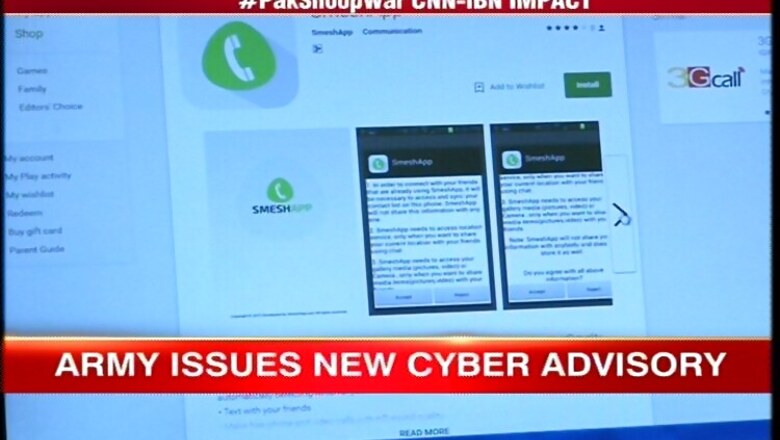
views
Hours after details of Pakistan snooping on Indian soldiers using Facebook and mobile apps emerged, the Army issued a new advisory of dos and don'ts to all its commands which are to be followed by soldiers while they are using the Internet and mobile. Even as former president APJ Abdul Kalam had warned of cyber warfare in 2009, the country's plans of upgrading its cyber security architecture have remained in cold storage till a CNN-IBN expose revealed how Pakistan was using it to keep a tab on Indian soldiers.
The Army had issued an advisory earlier as well asking the soldier to stay away from the Internet. The personnel have been asked not to watch porn on Facebook or social networking sites, not use photos in uniform as profile picture on WhatsApp, Facebook etc.
The troops are being advised not to click advertisements on social sites offering prizes or awards and not to reveal official identity on such sites. They have also been advised against revealing rank/battalion and place of posting. Officers have been advised not to upload pictures with weapons even in civil dress and background of photographs should not have anything related to military.
The troops have been asked not to accept friend request from unknown people and not to save any information related to military on their computers/laptops. Even soldiers' families are being asked not to reveal their professions on websites.
A CNN-IBN investigation has exposed how Pakistan's Inter Service Intelligence (ISI) agency is getting tactical information by snooping on Indian military personnel through a malicious application called Smesh. On Tuesday, Google removed the application from its playstore but the expose has raised several questions on how and why is India unable to protect and deal with such kind of cyber threats.
The CNN-IBN investigation revealed that the malicious software was used by Pakistani agencies to hack smartphones of more than 200 top officers of the Indian Army, Border Security Force and Government of India.
The app was used to access crucial information on troop movements and counter terrorism operations.
The expose has sent shockwaves across the security establishment and the Army has advised its personnel to avoid using Smesh, We-chat and Line apps.
The investigation revealed that officers of the armed forces are being honeytrapped on social media websites like Facebook using fake profiles of young women with Indian names.
The operation takes place in several stages. The contact is first established in the form of friend requests and once it is accepted, the cyber spies chat or share messages with the targets and win their trust. Soon they invite them to download SmeshApp, a malware disguised as a messaging device.
After the malicious application is downloaded, the officer's smartphone becomes Pakistan's spy. From here on the officer's phone is virtually remote controlled from a command centre across the border. The officer is now under watch 24 hours a day, 60 minutes an hour, every single second.
The application is so effective that all the activities of the trapped officer on his phone - like SMSes, emails, every single keystroke - now goes to a server in Germany.
The messages suspected to be accessed by the Pakistani spy command included those of personal nature like SMSes from family and even financial transactions.
The security agencies fear the camera on the hacked cellphones were also being used real time, transmitting exact location details of the officer, and often pictures of his surroundings.
CNN-IBN digged further to find the handler of the elaborate spy network SmeshApp. The Internet trail revealed that is registered in the name of one Sajid Rana, organization - private, address - Laloo Khait 1A, Karachi - 45000, Pakistan, Phone number - +923214510178,
When Sajid Rana's telephone number was keyed on Truecaller app, it was found to registered in the name of Ayan Butt. But his email ID interestingly is an Indian one [email protected]
Earlier snooping by Pakistan used to take place at border areas. What started from catching radio and TV signals on either side progressed on to hacking of landlines and telegraph lines. Smartphone hacking is the latest in the decades old phenomenon of snooping by Pakistan. The Army is taking the threat very seriously and will be issuing more advisories for its personnel.




















Comments
0 comment